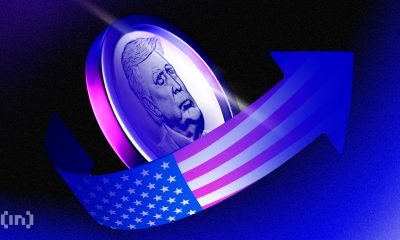Regulation
Cardano Founder Charles Hoskinson Breaks Silence On Operation Chokepoint 2.0

Cardano founder Charles Hoskinson has recently commented on Operation Chokepoint 2.0, calling it a global and highly targeted attack on the cryptocurrency industry. He said that the effects have led to long-term financial and psychological damages, and called on the industry to act as one and fight for new laws banning such activities from happening again.
Cardano Founder Stance on Operation Chokepoint 2.0
In a recent X (previously Twitter) post, Cardano founder Charles Hoskinson revealed his concerns about the global implications of Operation Chokepoint 2.0. He said the campaign is a systematic process of harassing, fining, auditing, and denying services to cryptocurrency businesses across the globe. These comments align with pro-crypto lawyer John Deaton’s stance that the Trump administration should investigate Operation Chokepoint 2.0.
The global fallout from Operation Chokepoint 2.0. So many people put their head in the sand for political reasons, saying it’s not as bad as the industry was making it out to be.
It is worse and global. So many businesses were harassed, fined, audited, and de-platformed. It has… https://t.co/kKu2qGp8Ae
— Charles Hoskinson (@IOHK_Charles) November 30, 2024
He said that the operation went beyond the United States, which made the banks move to debank cryptocurrency entities out of fear of losing their correspondent relationships with American banks.
Charles Hoskinson also pointed to the implications that this has for companies and people within the cryptocurrency space in terms of economic and emotional pain. He called on the industry to capitalize on the situation in order to lobby for laws against future actions of this kind. “We have a small window of time to get a law passed,” he wrote, stressing the urgency of collaborative action.
Industry Leaders Speak Out on Debanking Crisis
The remarks by the Cardano founder Charles Hoskinson echoes the sentiments of many in the industry as they criticize Operation Chokepoint 2.0. An entrepreneur from Barbados – Gabriel Abed told his story about how First Citizens Caribbean Bank closed his account after he received a deposit from Kraken related to Bitcoin.
He said that the bank closed his account because the bank had concerns over the U.S. correspondent relationships while he had been banking with them for ten years.
Faryar Shirzad from Coinbase, Chief Policy Officer, provided similar examples of other players in the field, citing the research by Nic Carter. Shirzad has urged the need to enhance the public disclosure and the rule of law to the actions of such government agencies. He also stressed the importance of supervising the banks in order not to let such politically motivated campaigns happen again.
Ripple CTO and Others Condemn Indirect Regulation
Ripple’s Chief Technology Officer David Schwartz also joined the discussion to describe debanking as a form of indirect regulation. According to Schwartz, those actions violate basic legal concepts such as due process, freedom of speech, and prohibitions against unlawful searches.
“It is easier to force banks to stop doing business with undesirable clients than to make this business unlawful,” he said, calling on the government to use legal and transparent means to address the matter.
Many prominent tech individuals have also reported cases of debanking. Frax Finance founder Sam Kazemian was debanked by JPMorgan Chase in late 2022, while Coinbase CEO Brian Armstrong has made FOIA requests to discover the extent of government involvement. Armstrong called the campaign “unethical” and claimed that top-tier personalities like Senator Elizabeth Warren and SEC Chairman Gary Gensler were instrumental in the effort
Disclaimer: The presented content may include the personal opinion of the author and is subject to market condition. Do your market research before investing in cryptocurrencies. The author or the publication does not hold any responsibility for your personal financial loss.
Regulation
USDC Issuer Circle Set To File IPO In April, Here’s All

USDC issuer Circle is reportedly set to file its initial public offering (IPO) in April as part of the firm’s plans to finally go public. The stablecoin issuer is allegedly already working with top financial institutions to achieve this move.
Circle To File IPO In Late April
According to a Fortune report, Circle is looking to file its IPO in late April, although the listing period remains uncertain. The report noted that when a company files to go public, its shares usually begin trading four weeks later, indicating that the listing could occur in May. However, there is also a scenario where the IPO process could drag on for months.
The stablecoin issuer is reportedly working with investment banks JPMorgan Chase and Citi to achieve its long-anticipated IPO. The firm had previously tried to go public in 2021 under a SPAC arrangement with a shell company.
The US SEC failed to sign off on this arrangement back then, and the company eventually scrapped these IPO plans by the end of 2022 when the crypto exchange FTX collapsed and the broader crypto market experienced a downturn.
Revelation about Circle’s IPO plans comes just days after the stablecoin issuer partnered with NYSE’s parent company to explore USDC’s use in traditional finance (TradFi). Meanwhile, the USDC stablecoin recently launched in Japan following approval from the country’s regulator. Notably, USDC is the first and only global dollar stablecoin approved under Japan’s stablecoin framework.
An Easier Path Now For The Stablecoin Issuer
Circle will likely face less resistance for its IPO plans under the current SEC administration. Under acting Chair Mark Uyeda, the Commission has shown its willingness to work hand in hand with crypto firms, which was missing under Gary Gensler’s administration.
US SEC Chair nominee Paul Atkins has also shown his willingness to change the approach that Gensler’s administration adopted towards crypto firms. During his nomination hearing, the SEC Chair nominee promised to prioritize providing regulatory clarity for the industry.
Circle’s IPO listing would be the biggest since the top crypto exchange Coinbase went public in 2021. Interestingly, Coinbase owns an equity stake in the crypto firm.
The firm’s USDC is currently the second-largest stablecoin by market cap, only behind Tether’s USDT. The stablecoin industry is heating up as more financial institutions look to develop their own stablecoin.
Donald Trump’s World Liberty Financial recently revealed plans to launch its USD1 stablecoin, while asset manager Fidelity is also considering doing so.
Disclaimer: The presented content may include the personal opinion of the author and is subject to market condition. Do your market research before investing in cryptocurrencies. The author or the publication does not hold any responsibility for your personal financial loss.
Regulation
Japan Set To Classify Cryptocurrencies As Financial Products, Here’s All

Cryptocurrency investors in Japan are bracing for impact following a plan to reclassify digital assets as financial products. While the plan has elicited excitement from cryptocurrency enthusiasts in the Far East, the ambitious plan will have to scale several legislative hurdles.
Japan Targets Reclassification Of Cryptocurrencies As Financial Products
According to a report by Nikkei, Japan’s Financial Services Agency (FSA) is inching toward classifying cryptocurrencies as financial products. Per the report, the FSA intends to achieve the reclassification via an amendment to the Financial Instruments and Exchange Act.
Currently, digital assets in Japan are considered crypto assets conferred with property rights and seen as payment means. Under the FSA’s plans, cryptocurrencies in Japan will be treated as financial products in the same manner as traditional financial products.
The FSA says it will adopt a slow and steady approach toward the reclassification, carrying out “a private expert study group” to test the waters. If everything goes according to plan, the FSA will submit the amended bill to Parliament in early 2026.
The classification of cryptocurrencies as financial products will have far-reaching consequences for the local ecosystem. Experts say treating cryptocurrencies as financial products will bring Japan closer to a crypto ETF launch amid a changing regulatory landscape.
Furthermore, the move may lower current cryptocurrency taxation for local investors since existing capital market rules will apply to the asset class.
A Fresh Bill For Crypto Insider Trading Is Underway
Apart from the reclassification, the FSA disclosed plans for new legislation against insider trading. The move flows treating cryptocurrencies as financial products and will strengthen existing investor protection rules.
“It is a direction to establish a new insider trading regulation that prohibits trading based on unpublished internal information,” said the FSA. “We will develop laws to prevent unfair transactions.”
However, Japan’s cryptocurrency scene is heating up to a boil, driven by local and international players. Last week, stablecoin issuer Circle secured approval from the FSA for USDC with top exchanges set to list the stablecoin.
Japan’s Metaplanet has tapped Eric Trump to join its Strategic Board of Advisors as it continues to load up Bitcoin.
Disclaimer: The presented content may include the personal opinion of the author and is subject to market condition. Do your market research before investing in cryptocurrencies. The author or the publication does not hold any responsibility for your personal financial loss.
Regulation
Kentucky Governor Signs Off On ‘Bitcoin Rights’ Bill, Strengthening Crypto Protections


In what is being dubbed a major development in the crypto regulation space, the Governor of the US state of Kentucky, Andy Beshear, has signed the ‘Bitcoin Rights’ bill into law. The law promises to safeguard protections for Bitcoin (BTC) users.
Bitcoin Rights Bill Comes Into Effect
Crypto regulations continue to evolve under pro-crypto US President Donald Trump’s administration. In the latest development, Kentucky has become the newest state to enshrine protections for digital asset users.
In an X post published on March 24, crypto advocacy group Satoshi Action Fund announced that Governor Beshear had signed the much-anticipated Bitcoin Rights bill into law. The post stated:
The right to self-custody, run a node, and use of digital assets is now protected for millions of Americans without fear of discrimination.
The bill was first introduced to the Kentucky House by Rep. Adam Bowling on February 19. According to the bill’s description, it seeks to safeguard users’ rights to use digital assets and self-custody wallets. Additionally, it aims to prohibit local zoning changes that discriminate against crypto mining operations.
The legislation outlines guidelines for running a digital asset node and excludes digital asset mining from money transmitter license requirements. It also clarifies that crypto mining or staking is not considered an offer or sale of securities.
On February 28, the bill passed Kentucky’s House of Representatives with a unanimous vote of all 91 representatives in favor. It later passed the Kentucky Senate on March 13, receiving backing from all 37 senators.
Kentucky’s proactive stance toward cryptocurrencies isn’t new. Earlier this year, the state became the 16th US state to introduce legislation seeking to create a Bitcoin strategic reserve.
Meanwhile, neighboring state Arizona is also joining the crypto movement. A recent X post by Bitcoin Laws revealed that Arizona’s House Rules Committee has passed two Bitcoin reserve bills — SB1373 and SB1025. These bills will now head to a full floor vote.
Renewed Optimism Under Trump Administration
Following Trump’s victory in the November presidential election, cryptocurrency regulations in the US are evolving rapidly, with many states introducing legislation aimed at strengthening their digital asset ecosystems and attracting crypto businesses.
Positive changes in crypto regulations are encouraging industry businesses to expand. For instance, leading crypto trading platform Coinbase recently announced plans to hire 1,000 employees in the US.
The Trump administration has also witnessed several lawsuits being dropped against major crypto entities, including Kraken, Coinbase, Gemini, and others. At press time, Bitcoin trades at $87,399, down 0.2% in the past 24 hours.

Featured Image from Unsplash.com, chart from TradingView.com

Editorial Process for bitcoinist is centered on delivering thoroughly researched, accurate, and unbiased content. We uphold strict sourcing standards, and each page undergoes diligent review by our team of top technology experts and seasoned editors. This process ensures the integrity, relevance, and value of our content for our readers.
-

 Regulation23 hours ago
Regulation23 hours agoJapan Set To Classify Cryptocurrencies As Financial Products, Here’s All
-

 Market22 hours ago
Market22 hours agoTop 3 Made in USA Coins to Watch This Week
-

 Market21 hours ago
Market21 hours agoSolana (SOL) Price Risks Dip Below $110 as Bears Gain Control
-

 Altcoin16 hours ago
Altcoin16 hours agoCardano Price Eyes Massive Pump In May Following Cyclical Patern From 2024
-

 Market12 hours ago
Market12 hours agoBitcoin Bears Tighten Grip—Where’s the Next Support?
-

 Market11 hours ago
Market11 hours agoEthereum Price Weakens—Can Bulls Prevent a Major Breakdown?




















✓ Share: